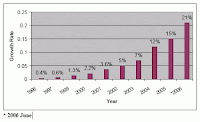
Note: My intention is not to promote any product, brand or company, but to promote sustainability of Telecentres.
On my way to Hambantota (A district in the deep south of Sri Lanka), I could see many Telecentres (Nenasalas). Out of those Telecentres some of them were with billboard as shown in the above image. Some others, which did not have those kinds of billboards, were closed and not operational.
I don’t try to come to the conclusion that those were closed simply because they did not have billboards provided by a private company.
But those billboards show us how far they have got integrated with other systems, for their own sustainability. Most of the Telecentres initiated with public funds or with funding from development organizations could be sustained through the involvement of the private sector.
Fortunately in Sri Lanka, the macro level policy decisions also have contributed towards the sustainability. Making a competitive environment within the telecommunication industry, adoption of new technologies such as Wi-MAX and HSPA are favorable for sustainability of Telecentres.
-Sameera.



